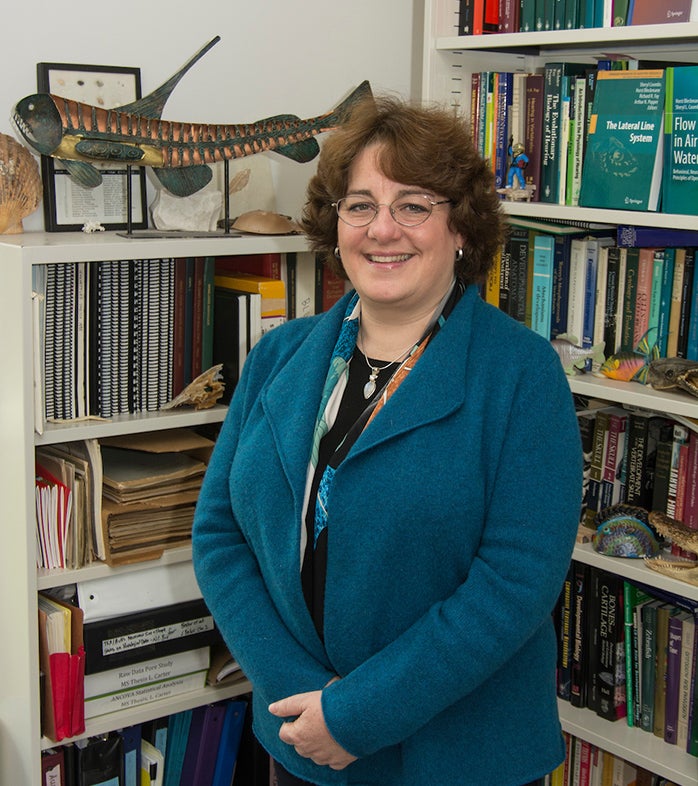KINGSTON, R.I. – November 17, 2016 – As a student growing up in Brooklyn, Jacqueline Webb volunteered at the New York Aquarium, attended an experimental public high school that focused on marine biology, and enrolled in a field course at the Shoals Marine Lab off the coast of New Hampshire. So it is no wonder that she became an award-winning marine biology professor.
“I grew up by the ocean, my father fished, it was the Jacques Cousteau era,” said Webb, who lives in Wakefield and joined the University of Rhode Island faculty in 2006. “I always knew I wanted to be a biologist, and it was in high school that I realized marine biology was going to be my thing.”
In recognition of her research and teaching excellence, Webb has been appointed the University’s first George and Barbara Young Chair in Biology.
“Dr. Webb has been a strong leader and advocate for our students, marine biology, and basic biological research,” said John Kirby, dean of the URI College of the Environment and Life Sciences. “She has been highly successful in all areas of her appointment and is in many ways a model of achievement. This chair provides recognition for her excellence and high levels of achievement.”
“It is truly a great honor,” Webb said of her selection. “The appointment will give me an opportunity to kick-start new research projects and establish some new research collaborations. In addition, it will provide enhanced support not only for my work, but also for the work of the many students who collaborate with me in my lab.”
The endowed chair, the first in the College of the Environment and Life Sciences, provides annual funding to support faculty research. It was established with a gift from the estate of George and Barbara Young of East Greenwich. George Young, a physician, graduated from URI in 1925.
Webb earned a bachelor’s degree at Cornell University and a doctorate at Boston University, where she started her studies of fish sensory systems. She later held postdoctoral research positions at Scripps Institution of Oceanography, Cornell University’s College of Veterinary Medicine, and Friday Harbor Laboratories of the University of Washington. Her first faculty position was at Villanova University, where she taught for 13 years before being hired by URI to provide leadership for its Marine Biology Program.
She is especially proud of the progress she has made at increasing the number of students majoring in marine biology, enhancing the program’s reputation nationally, and establishing a strong advising system.
“I’m very proud of our marine biology graduates,” Webb said. “They’re an accomplished and happy group. So many have continued to work and study in the fields of marine and environmental science using their URI education in very positive ways.”
Her scientific reputation is the result of her studies of the structure and development of fish sensory systems. She is an expert on the mechanosensory lateral line system, a primitive vertebrate sensory system found in all of the world’s 30,000 fish species, as well as in aquatic amphibians. The lateral line system consists of dozens of small sensory organs on the head and body called neuromasts that detect water flows, facilitating critical behaviors like prey detection, predator avoidance, communication during mating, and navigation.
According to Webb, understanding the ability of fishes to detect water flows can shed light on how they may overcome challenges presented by global climate change. “As human activities increasingly affect freshwater habitats, water clarity is often decreased, and it’s likely that fishes that depend more on their lateral line system instead of vision for certain behaviors may have an ecological advantage,” she said.
Webb and her students have made several important discoveries in recent years. Former doctoral student Margot Schwalbe revealed, for instance, that certain cichlids in Lake Malawi in East Africa use their lateral line system to detect water flows generated by prey in the dark, suggesting for the first time that they may feed nocturnally. This year graduate student Ashley Marranzino discovered that the lateral line system of a prominent group of deep-sea fishes, the dragonfishes, have hundreds of neuromasts. This likely makes them especially sensitive to water flows, which is important for survival in the deep sea.
Webb and postdoctoral researcher Yinan Hu are now working on the sensory biology of coral reef fishes, seeking to understand how their small larvae, which are dispersed in the open ocean, actively seek out coral reef habitats where they will live out their lives.
Funded by several National Science Foundation grants, Webb’s research has resulted in the publication of more than 40 scientific papers and book chapters. She also edited a book on fish bioacoustics. An affiliate faculty member in URI’s Interdisciplinary Neuroscience Program, Webb is a research associate at Harvard University’s Museum of Comparative Zoology, a guest investigator at the Woods Hole Oceanographic Institution, and in 2013, she was awarded a Whitman Summer Fellowship for research at the Marine Biological Laboratory in Woods Hole.

